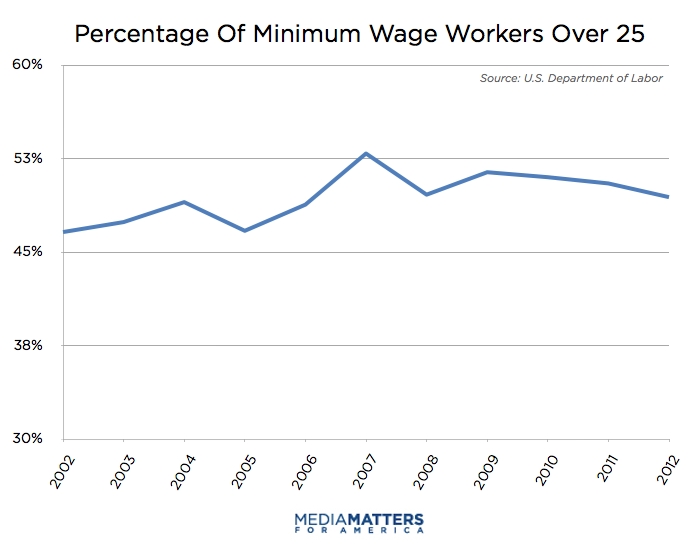In an effort to downplay the necessity of increasing the minimum wage, right-wing media figures have forwarded the notion that minimum wage jobs are primarily for teenagers and are a “stepping stone” to higher paying future employment. However, the prospects for upward mobility among minimum wage workers remain grim.
Right-Wing Media Promote Minimum Wage Mobility Fantasy
Written by Craig Harrington
Published
Fox Claims Minimum Wage Intended For Teens, Meant As Stepping Stone For Higher Paid Work
Bill O'Reilly: You Get A Job, You Get A Reference, You Get A Better Job. On the July 31 edition of Fox News' The O'Reilly Factor, host Bill O'Reilly recalled his time spent working for minimum wage at Carvel Ice Cream. O'Reilly offered a standard critique of minimum wage jobs as a stepping stone to higher paying work stating, “you do that to get a couple of years' experience, or whatever, and then you move into a better job.” [Fox News, The O'Reilly Factor, 7/31/13]
Charles Payne: “You've Got An Opportunity To Work Your Way Up Within The Organization.” On the July 29 edition of Fox News' Your World, host Neil Cavuto and Fox Business contributor Charles Payne discussed ongoing fast food worker demands for higher wages. Payne claimed that employees need to “work [their] way up while [they're] within the organization” and that higher wages would reward “mediocrity” and encourage social degradation. [Fox News, Your World, 7/29/13]
Neil Cavuto: Minimum Wage Opened Opportunities. On the July 30 edition of Fox News' Your World, host Neil Cavuto recalled his time spent working for minimum wage at Arthur Treacher's Fish and Chips, claiming that he was willing to work for a fraction of what minimum wage workers make today and was quickly promoted to higher paying positions, stating, “It all started at two bucks an hour.” [Fox News, Your World, 7/30/13]
Rick Berman: Employees Should Find Higher Wages “Someplace Else.” On the July 29 edition of Fox Business' Varney & Co., host Stuart Varney and Richard Berman of the Employment Policies Institute -- a front group for fast food lobbyists -- discussed fast food worker demands for higher wages. Berman claimed that employees who desired better pay simply need to “find a job someplace else, where the business model pays higher wages.” [Fox Business, Varney & Co., 7/29/13]
Minimum Wage Work Is Not Designed As A Stepping Stone For Teens
Half Of Minimum Wage Workers Are Over 25. Contrary to the conservative talking point that minimum wage jobs are ideally suited for teenagers and entry-level workers, Department of Labor data show roughly half of all minimum wage workers are over 25 years old. [Bureau of Labor Statistics, accessed 7/18/13]

CEPR: Minimum Wage Workers “Older And Better Educated Than Ever.” In an April 2012 report, the Center for Economic and Policy Research revealed that from 1979 to 2011 the share of low-wage workers with some college education increased from 19.5 to 33.3 percent. An additional 9.9 percent of low-wage workers had also completed a college degree, up from just 5.7 percent in 1979. [Center for Economic and Policy Research, April 2012]
CEPR: U.S. Minimum Wage “Too Low” To Reduce Low-Wage Work. In a January 2012 report, the Center for Economic and Policy Research found that the United States led all wealthy member states of the Organisation for Economic Cooperation and Development (OECD) in low wage work. CEPR went on to conclude that the U.S. minimum wage was “too low to reduce the share of low-wage work”. [Center for Economic and Policy Research, January 2012]
Socio-Economic Mobility Is Not Guaranteed For Low-Wage Workers
NELP: Entry-Level Workers “Going Nowhere Fast.” In a July 2013 review of low-wage positions in the fast food industry titled “Going Nowhere Fast,” the National Employment Law Project found that entry-level positions offered very little room for promotion or advancement. The study also concluded the fast food industry purposely engages in misinformation promoting a “mobility myth” to employees:
Despite what the data make clear about the barriers to upward mobility in the fast food industry, spokespersons for the industry and representatives from the major chains have collectively promoted a “mobility myth” that characterizes low-wage fast food jobs as springboards for advancement to managerial positions or opportunities to open a franchise [National Employment Law Project, July 2013]
BLS: Many Low-Wage Workers Experience Stagnant, Negative Earnings Potential Over Time. According to a July 2006 report from the Bureau of Labor Statistics, in the period 1995 to 2001, some permanently employed individuals were able to escape poverty through income gains in low-wage work, but significant numbers saw no income gains or experienced income losses. From the report:
These comparisons document the fact that, among low-income earners, many see significant gains in income that, if continued, will result in their escaping poverty. However, there is also a sizable component of this population for whom no, or even highly negative, earnings growth is evident, worsening over the long term. [Bureau of Labor Statistics, July 2006]
CEPR: Emphasis Must Be On Improving Low-Wage Conditions. Citing the expanding scale of low-wage jobs in the American workforce, the Center for Economic and Policy Research concluded in 2007 that policies should be directed toward improving that employment profile:
Given the prevalence of low-wage jobs without benefits in our labor market, and the likelihood that these sectors will grow rather than decline, some attention to the strategy of improving the jobs is critical to strengthening our economy and communities. Unless these jobs are improved, our nation will permanently consign a large portion of workers in the United States to bad jobs. [Center for Economic and Policy Research, August 2007]
For more on right-wing media myths on the minimum wage, click here.